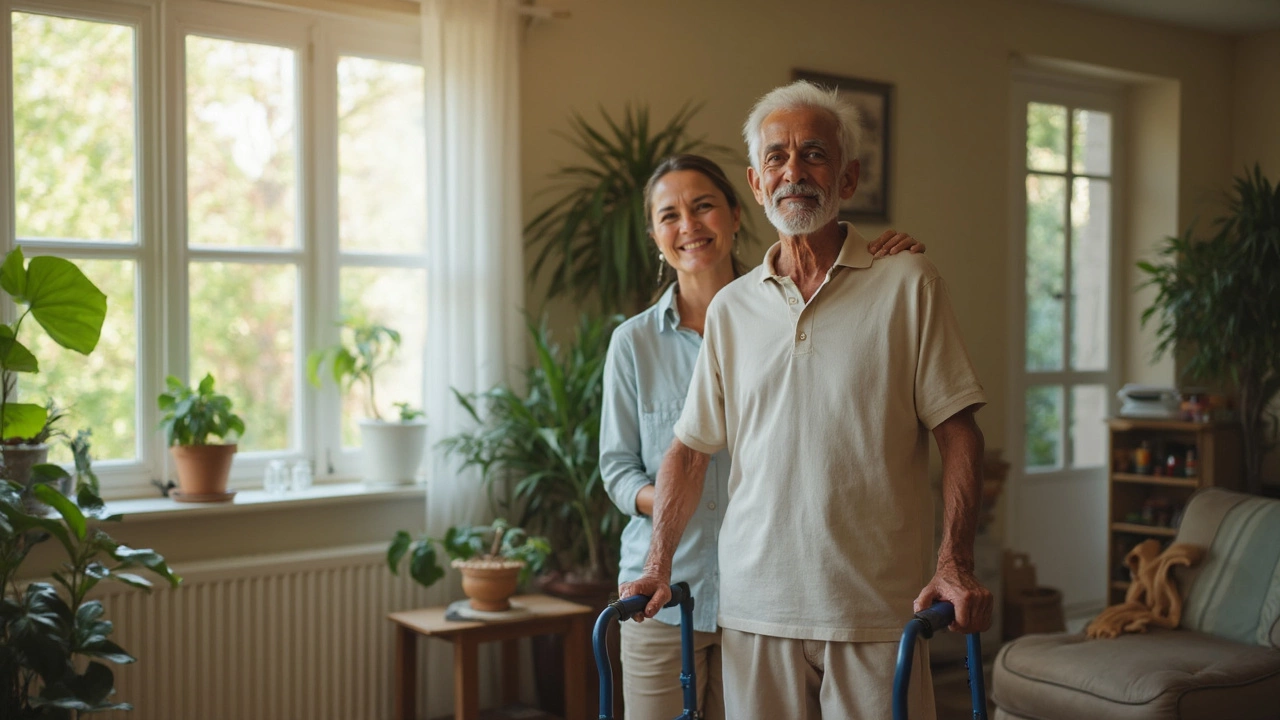The idea of living alone after open-heart surgery makes most folks picture a marathon, not a sprint. But here’s something you might not know: most people expect to bounce back much faster than their bodies are ready. My own uncle thought he’d be grilling burgers by week two. He learned fast—just getting out of bed felt like a workout. If you’re itching to get your independence back but wondering, “When can I actually live alone after heart surgery?” stick around. The answer is as much about headspace as it is about your ticker and stitches.
What Happens During Open-Heart Surgery and Initial Recovery
Let’s rip the Band-Aid off: open-heart surgery isn’t a minor tune-up, it’s a deep overhaul. Surgeons typically crack open your chest, either through a big incision (median sternotomy) or a smaller one off to the side. We’re talking hours under anesthesia, with a machine handling your heartbeat and breathing. Common reasons? Coronary artery bypass grafting (CABG for short), heart valve repairs, sometimes fixing congenital defects.
The first 48 hours post-surgery? You’re basically living on a hospital planet. IVs, beeping machines, wires everywhere, a night nurse that checks your pulse every hour. The heart-lung machine takes a break, your heart does the heavy lifting again. Most folks get moved from intensive care to a step-down unit within a couple days.
Your chest will hurt—a lot. Think: the worst gym soreness but in your bones. There’s a breathing tube shoved down your throat (taken out soon, thankfully). Some people shiver or hallucinate from the anesthesia wearing off. The medical team keeps you on pain meds, plus blood thinners and antibiotics. You’ll have a chest tube draining out fluids. Don’t expect privacy or dignity for a bit—nurses are helping you roll, eat, stand, and visit the bathroom.
After 4 to 7 days—if there are no complications—you’re discharged. But “going home” doesn’t mean “living like before.” It’s the start of the hard part: learning how little you can do by yourself at first, and figuring out what a safe timeline looks like.
From Leaving the Hospital to Basic Independence
Here’s the tricky truth: you can technically live alone as soon as they discharge you, but whether you should is another story. Most surgeons, nurses, and physical therapists suggest you have someone with you around the clock for the first two weeks—minimum. You might be able to dress yourself or use the bathroom, but what about cooking, doing dishes, lifting laundry baskets, or grabbing groceries? Not so fast.
During those crucial first weeks, you’re still managing pain, dealing with fatigue that feels like slogging through mud, struggling to sleep, handling wound care, and possibly battling brain fog. Your sternum is still knitting together. Even a sneeze can feel like an explosion—and can mess up the healing incisions.
If you slip or drop something heavy, you can’t risk bending, reaching, or twisting suddenly. Ever tried opening a new jar with a fractured rib? Trust me, it’s not happening. And you shouldn’t drive, because sudden moves or pain could distract you. Doctors typically put heavy-lifting bans in place—nothing over 5 or 10 pounds. My friend’s dad set his coffee mug down for a week because the “no lifting” rule spooked him.
If you want to see what most hospitals suggest for independence milestones, here’s a handy table with open-heart surgery recovery stats:
| Activity | Timeline Post-Surgery |
|---|---|
| Showering Alone | 7-10 days (if wounds are clean) |
| Stairs (with help or rails) | 5-14 days |
| Light Cooking | 10-14 days |
| Driving | 4-6 weeks for most patients |
| Returning to Work (desk job) | 6-8 weeks |
| Lifting (over 10 lbs) | 2-3 months |
| Full Independence (alone) | 2-4 weeks, case by case |
So—can you live totally solo when you leave the hospital? Most folks need practical help for 2 to 3 weeks, even if it’s just a neighbor checking in or a meal delivery. By week three or four, you’ll probably be more mobile, steady, and able to cook, care for pets, and take care of light house chores. But have backup ready: a smartphone always nearby, a friend on speed dial, and someone who can pop by in an emergency.

Signs You’re Ready to Live Alone (And Red Flags to Watch For)
Now we’re getting to the juicy part: how do you actually tell if you can hack it solo? Doctors don’t just look at your incisions and say “Yep, you’re good.” You need to tick off a few boxes first, both physical and mental.
- You can get in and out of bed easily, without help
- Walking around the house doesn’t leave you winded or dizzy
- You’re eating regular meals, staying hydrated without reminders
- Your pain is controlled with oral meds (no IV necessary)
- You can manage your own wound care or daily dressings
- Your brain feels clear—you can remember to take medication, spot infection signs, and call the doctor if needed
- Showering, dressing, and toilet visits are solo (with adaptive tools if needed)
- There’s a plan for in case you feel faint or have chest pain (neighbors, cell phone, medical alert device)
Now for the stuff that means: hold up, do NOT live alone yet. Watch out for:
- Dizziness, severe fatigue that keeps you in bed most of the day
- Pain not managed by over-the-counter meds
- Drainage, redness, or foul smell from your incision
- Shortness of breath that gets worse with small efforts
- New swelling in your legs, ankles, or feet
- Confusion, forgetfulness, or trouble communicating clearly
- Trouble eating, drinking, or keeping food down
Doctors and home nurses sometimes swear by the “stair test.” If you can walk up and down a flight safely, you’re usually close to basic independence. But always double-check with your surgeon and visiting nurse. They know your specific surgery, risks, and how tricky those early weeks can be if problems pop up.
Tips for Smooth Solo Recovery: Making Life Easier Post-Surgery
Full honesty: I wish I’d had this list when my dad came home from heart surgery and we tried to rig everything with duct tape and too many pillows. You can DIY most of it with stuff you’ve got lying around, but a few smart tweaks make solo recovery a million times easier.
- Prep freezer meals or stock up on healthy pre-made food—microwave, not stovetop, is your friend
- Keep daily meds in a weekly pill case, and set alarms on your phone
- Move pots, dishes, and bathroom essentials to waist level (no reaching high or low)
- Plug your phone charger next to your bed (think: 2AM doctor call)
- Install a shower chair and a hand-held showerhead if you can
- Put a non-slip mat in the bathroom and dim night lights so groggy trips are safer
- Wear zip-up hoodies and sweatpants (no buttons, no pulling arms overhead)
- Keep a grabber tool handy to pick up dropped items—especially pet toys if you’ve got a Max living at home like I do
- Give someone you trust a key, in case you can’t open the door (this saved my neighbor once when his stitches bled and EMTs had to come in quick!)
Don’t forget your headspace. Recovery feels slow, and plenty of people get hit hard by post-op blues—feeling anxious, irritable, or unmotivated. If you’ve got kids (like my daughter Maya, who left sticky notes in every room that said “Don’t give up, Dad!”), ask them to call or facetime regularly. Even a dog can help—Max forcing me on slow backyard walks was the best rehab around.

How Your Doctor Decides When You’re Ready—And What to Ask at Each Stage
Doctors like specifics. Before they’ll say “okay, you can live alone,” you’ll go through a checklist during follow-up visits. They’ll check your vitals, incision site, ask about your pain, and run blood tests. They’ll want to know how you’re sleeping and moving. If you’ve started cardiac rehab at week 2 or 3, they’ll see how winded you get and how you bounce back after short walks or gentle cycling. Some docs even want a home safety assessment—they’ll ask if you’ve got grab rails or non-slip mats set up. Your doctor might suggest a visiting nurse for a little longer than you expected. Don’t fight it. It’s not about you being weak—it’s about giving that newly fixed heart the rest of its life deserves.
Here are a few real-world questions you should ask at your post-surgery appointments. Clip them to your fridge:
- “If I feel faint or can’t get out of bed, who do I call first?”
- “Which symptoms mean I need to go to the ER immediately?”
- “When do I absolutely need to have someone with me—overnight or just during the day?”
- “When will I see you/your nurse again to check my wound?”
- “Can I do laundry, vacuum, walk the dog, carry groceries next week?”
- “When will my lifting/driving bans end?”
- “Can you recommend safe exercises or online cardiac rehab I can do at home?”
If in doubt, always err on the side of asking for help. No one gets a medal for doing recovery solo—just a safer, longer life. Your independence will come roaring back soon. Take it one small, stubborn step at a time, and don’t let pride trip you up.
